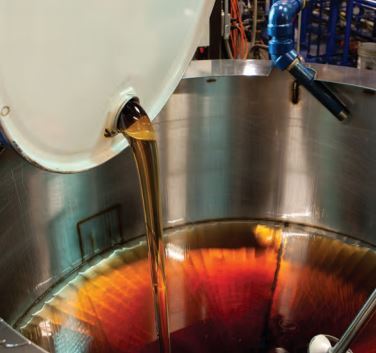Are all Synthetic Oil Groups the Same? Group III vs IV vs V
The simple answer
No. In fact, there are wide performance differences between base oil categories. Generally speaking, Group IV base oils offer the best performance, Group III second best, and so on in reverse order. But be forewarned – there are exceptions. And, you can’t judge motor oil performance solely on base oil type. You must take into account its entire formulation, including the additives.
The detailed answer
Ever find yourself in an awkward conversation from which you want to escape? Start talking about base oils and the relative merits of each category. Your adversary will immediately excuse himself.
To ease your study of the topic, it’s broken down into the following common questions:
What are the different base oil categories?
The American Petroleum Institute (API) developed a classification system for base oils that focuses on the paraffin and sulfur content and degree of saturation of the oil. The saturate level indicates the level of molecules completely saturated with hydrogen bonds, leaving them inherently un-reactive.
Translation: they’re more resilient to chemical degradation, meaning they last longer and perform better.
There are five groups in the classification system, ranging from Group I – Group V:
• Group I Characteristics
Group I base oils are the least refined of all the groups. They are usually a mix of different hydrocarbon chains with little uniformity. While some automotive oils use these oils, they are generally used in less-demanding applications.
• Group II Characteristics
Group II base oils are common in mineral-based motor oils. They have fair-to-good performance in the areas of volatility, oxidation stability, wear prevention and flash/fire point. They have only fair performance in areas such as pour point and cold-crank viscosity.
• Group III Characteristics
Group III base oils consist of reconstructed molecules that offer improved performance in a wide range of areas, as well as good molecular uniformity and stability. These synthesized materials can be used in the production of synthetic and semi-synthetic lubricants.
• Group IV Characteristics
Group IV base oils are made from polyalphaolefins (PAO), which are chemically engineered synthesized base oils. PAOs offer excellent stability, molecular uniformity and improved performance.
• Group V Characteristics
Group V base oils are also chemically engineered oils that do not fall into any of the categories previously mentioned. Typical examples of Group V oils are esters, polyglycols and silicone. As with Group IV oils, Group V oils tend to offer performance advantages over Groups I – III. An example of a mineral-based Group V exception is a white oil, a very pure lubricant used in industries ranging from cosmetics to food processing.
Are the API group classifications progressively better?
In other words, is a motor oil made from Group III base oils better than one made from Group II base oils, and so on?
In general, yes. Unlike your food, which generally gets less healthy the more it’s processed, base oils offer improved performance as the level of refinement/processing increases.
But there are side cases that smash that rule of thumb.

Then we have the Group V category, which is a sort of catch-all for anything that doesn’t fit into the other four groups. In fact, some Group V oils are completely unsuitable for automotive use.
Are Group III base oils “synthetic?”
Yes, in most countries anyway.
A true definition for the term “synthetic oil” has been difficult to reach, although it has generally been accepted that the term represents those lubricants that have been specifically manufactured for a high level of performance. Group III base oils with very high viscosity indices can be called synthetic oils in most countries.
Historically, it was widely accepted that only Group IV base oils made from PAOs were true “synthetics.”
A famous lawsuit between Mobil and Castrol changed that. Mobil charged that Castrol was falsely marketing its Syntec motor oil as a synthetic oil although it wasn’t made from PAO base oils. Mobil’s claim was based on results of independent lab testing that showed samples of Syntec it obtained as early as December 1997 contained 100 percent mineral oil.
The two sides battled it out, but in a landmark 1999 ruling, the National Advertising Division of the Council of Better Business Bureaus ruled that Castrol Syntec, as then formulated, was a “synthetic” motor oil.
Debate raged then, and still rages today. You can find all kinds of purists populating Internet forums who refuse to recognize Group III oils as “synthetics.” For them, it’s PAO or nothing.
Try not to get caught up in the “my-base-oil-versus-your-base-oil” cage match. The base oils that go into the oil aren’t as important to your engine as the performance that comes out of the oil. Look for motor oils that offer performance claims backed by industry-standard testing or real-world results. That’s what’s really important.
If you really need to know which base oils a formulation uses, you’ll have to do some investigative work since oil companies protect that information as proprietary.
For details, check out this post: How Much “Synthetic” Is In My Oil?
Are synthetic base oils magic?
Ok, that’s not what people really ask. But many falsely think synthetic base oils are not refined from crude oil and that switching to only synthetic lubricants could drastically reduce our dependence on foreign oil and non-renewable sources. If synthetic base oils aren’t made from crude oil, from what raw material are they made? Unicorn horns and rainbow dust?
Synthetic base oils are made from crude. But they’re much more highly refined than conventional base oils. The chemical reaction process used to make synthetic base oils removes the impurities inherent to conventional base oils, such as sulfur and waxes. This results in a higher-performing product that’s much better for your engine.







